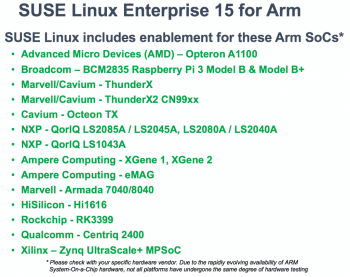The company has also come up with a new pricing approach. It now uses a model that has “core-based pricing for lower end Arm hardware and socket-based pricing for everything else”

SUSE has announced the general availability of SUSE Linux Enterprise Server (SLES) for Arm and SUSE Manager Lifecycle for Arm.
SUSE Linux Enterprise Server for Arm is an enterprise-grade Linux distribution that is optimized for unique 64-bit Arm chip capabilities. It enables solution providers and enterprise early adopters to gain faster time to market for innovative server and Internet of Things (IoT) device solutions. It has been available in the market for several years, but on a limited basis.
“Previously, SUSE subscriptions for the ARM hardware platforms were only available to SUSE Partners due to the relative immaturity of the ARM server platform,” Jay Kruemcke, a senior product manager at SUSE, wrote in a blog post.
“Now that we have delivered four releases of SUSE Linux Enterprise Server for Arm and have customers running SUSE Linux on Arm servers as diverse as the tiny Raspberry Pi and the high performance HPE Apollo 70 servers, we are now ready to sell subscriptions directly to customers,” added Kruemcke.
SUSE has enabled a variety Arm System-On-a-Chip (SOC) processors, including chips from Cavium, Broadcom, Marvell, NXP, Ampere, Rockchip, Xilinx, and Qualcomm Centriq.
One of the major advantages of the Arm platform compared to other platforms, as per the company, is the huge diversity of processors and processor features.

Hybrid pricing model
Kruemcke said the company has decided to use a model that has “core-based pricing for lower end Arm hardware and socket-based pricing for everything else.”
The new pricing for SUSE Linux Enterprise for Arm is tied to the number of processor cores in a server.
Servers with less than 16 cores are priced based on the number of groups of 4 processor cores. Each group of 4 cores, up to 15 cores, requires a 4-core group subscription that is stackable to a maximum 4 subscriptions. The number of cores is rounded up to the nearest group of 4 cores, therefore a server with 10 cores would require three 4-core group subscriptions.
Servers with 16 or more cores use the traditional 1-2 socket-based pricing.
This hybrid pricing model applies to SUSE products for Arm that have traditionally used socket-based pricing, such as the SUSE Linux Enterprise Server (SLES) for Arm and SUSE Manager Lifecycle. Other SUSE products such as SUSE Enterprise Storage uses server-based pricing and do not use this hybrid pricing, he said.
Subscriptions for SUSE Linux Enterprise Server for Arm and SUSE Manager Lifecycle for Arm are now available directly to customers through the Corporate price list or through the SUSE Shop https://www.suse.com/shop/











































































